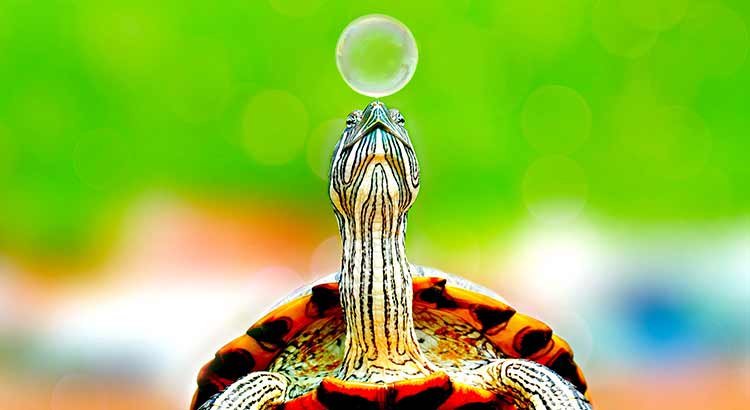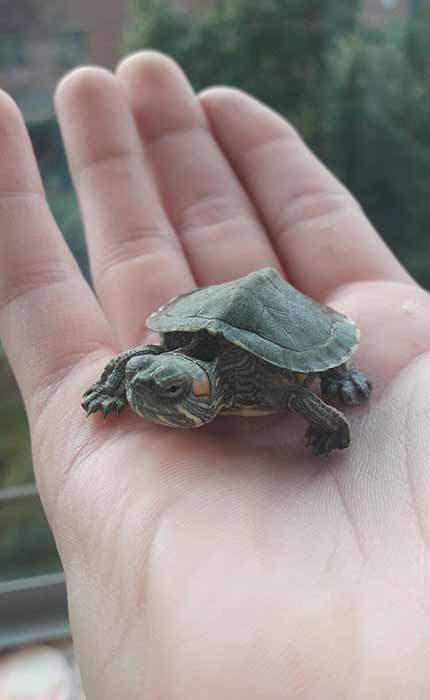Our turtles seem extremely intelligent, they always seem to know exactly what we’re up to and are always curious about what is happening around them, but how intelligent are they really? Here at Turtleowner.com, we’ve researched everything you need to know about the topic, and we want to share it with you
Turtles can be considered smart animals that have the capacity to solve problems, communicate with other turtles and humans, learn new skills, and adapt to a wide variety of situations.
So we can definitely say that turtles are smart, but saying exactly how smart they are is somewhat more difficult, but possible. And that is exactly what we are going to discuss in this article. We are going to you can measure the intelligence of a turtle and how that translates in real life.
How to Measure a Turtles’ Intelligence
In the case of animals, intelligence is measured based on a few criteria:
- The ability to solve problems
- The ability to communicate
- The ability to learn new skills
If an animal is able to do those 3 things, we can safely say that it is intelligent. But depending on how well it can do those four things, we can say if an animal is truly smart, or just barely intelligent enough to survive.
So let’s take a look at how intelligent turtles really are based on those criteria.
A Turtles’ Ability to Learn Skills and Tricks
Turtles, like most animals, aren’t able to learn what we, humans, would call practical skills, they can’t learn to drive a car, use a computer or use Excel. The skills that they can learn we usually call tricks. And turtles are able to learn tricks.
You can teach your turtle to shake your hand, rise on its back legs on command, follow you or simply to sit.
Here is a video from an old TV show, with a turtle that can do all of those things.
All it takes to teach a turtle to do those tricks, is a little bit of time and some rewards.
A trick is basically an association, for example, when you want to teach your turtle to sit, you will say “sit” if it does so you will give it a reward. And it will remember that if you say “sit” and it sits, it will be rewarded.
From my personal experience and what I’ve talked with other turtle owners, there is a very clear limit to the type of tricks a turtle can learn. The only types of tricks that it can learn are what I would call basic. This means that you can’t teach a turtle to fetch, or to bring you something, or even combine basic tricks, like shake the hand and do a spin.
Turtles are not able to remember or recognize complicated patterns, so the complexity of the tricks that they can learn is limited.
So judging by their ability to learn tricks, you can say that turtle are smart, not the smartest of them all, but they are smart.
A Turtles’ Ability to Solve Problems
Problem-solving usually means two very different things for humans than for animals. For us, it usually means solving a problem at work, or figuring out what is that strange noise coming from the microwave, things like that. But for turtles, and most animals, it means survival. Finding food, shelter, avoiding and escaping predator. Even house pets have the exact same priorities, even if we provide all of those things for them, they constantly think about them.
When it comes to problem-solving, turtles are pure geniuses, they are one of the most adaptable species, and they can be found in almost every corner of the world, in lakes, oceans, swamps, deserts and forests. The only place you won’t be able to find a turtle is the arctic. And this is possible due to their ability to adapt and solve problems.
A Turtles’ Ability to Communicate
The ability to communicate means more than the ability to produce sounds, it also means the ability to work together with others.
Turtles are solitary animals, and they prefer to be alone rather than in the company of other turtles, or any other creature for that matter. So overall, they try to stay away from everybody.
But when the situation calls for it, they are able to work together with other turtles. And one of the most common ways turtles work together is by forming stacks.
A short explanation of turtle stacking is this: Turtles stack on top of each other to get exposed to more sun rays, which provide UV rays, which are essential for turtles. Some other common reasons why turtles stack are to generate heat and to defend from predators.
If you would like to know more about turtle stacking, you can check out this article: Why Do Turtles Stack? (with Pictures and Videos)
Turtles also communicate with each other during the mating season. Some turtle species even for hunting packs, and some of them even establish small communities and go to visit their friends. If you want to know more about those things, you can check out this article: Do Turtles Talk? A Guide About Turtle Communication.
While there are some exceptions, overall turtles are not the most communicative species, so their social intelligence is not that well-developed, but if the need arises they can communicate very well.
The Turtle Brain
While simply having a larger brain doesn’t necessarily translate to intelligence, looking at the structure of the brain will provide you with a better understanding of how smart an animal is.
In general reptile, brains are not as complex, or as big as the brains of mammals. The structure of the brain it’s very similar to the structure of birds’ brains, but unlike mammals and birds’ brains, turtle brains lack the greatly enlarged cerebral hemispheres that are responsible for learning and reasoning. Which means that turtles are not the best when it comes to learning new and complex things.
Another way you can try to determine the intelligence of an animal is to compare the weight of the brain to the weight of the entire body (for more info about the ratio, you can look here). In the case of turtles, the growth is not completely uniform, so there is a theory that turtles are smarter when they are younger, and this is probably true for a lot of animals, not just turtles.
Keep in mind that the ratio between the weight of the body and the weight of the brain is not a perfect way to determine intelligence, there are animals out there that are exceptions to this rule.
Natural Instinct VS Intelligence
Natural instincts are something very different from intelligence, but they are also the result of intelligence. When you see a rook being thrown at you will immediately act, you won’t spend time thinking what would be the best direction to run or if it would be better to block it with your hand or avoid it. Those instincts come from the brain, but they are the results of what you have learned during your life, or information passed down genetically to you.
Most humans have lost a lot of instincts because we don’t need them, we aren’t always surrounded by dangers as we used to be thousands of years ago. But most animals still maintain their natural instincts, because they help them survive.
The fact that a turtle knows that it has to get into its shell and stay close to some rocks to blend in with the environment when they see or hear a predator bird nearby, is not necessarily a sign of spontaneous intelligence, it’s an instinct. But to reach this point where they have this instinct, they had to try many possibilities to see which is the best way to survive in this situation. The solution that they’ve found has been passed down genetically to their offspring. So the first turtles that existed weren’t born with this instinct, they had to learn it.
So instincts are not necessarily signs of intelligence, but they are the result of the cumulative intelligence of the species up to this point. The fact that turtles have instincts, it’s one of the best ways to prove that they have the ability to learn new abilities.
A Turtles’ Ability to Distinguish Between People
Another very clear sign of intelligence is the ability to distinguish people.
Unlike other animals, turtles don’t have a highly developed smell sense or hearing, so in order to distinguish other humans from their owner they have to rely on sight and their memory.
I cover this subject in greater detail in this article: Can Turtles Recognize Their Owners? If you are curious if your turtle sees you as its best friend, or just somebody that brings it food, you should definitely check out the article.
The Smartest Turtle Species
There are well over 300 turtles species in the world, and some of them are smarter than other, but none is smarter than the North American Wood Turtle.
The North American Wood Turtle is considered to be the smartest turtle species. The Wood Turtle has been the subject of many intelligence tests and has proven itself to be very smart for a reptile. Some Wood turtles are able to complete mazes as fast as laboratory rats, and they are also able to recall mazes in which they haven’t been after long periods of time. There are more feats of intelligence that the Wood turtle has proven, but those are some of the most impressive, let’s not forget that we as humans don’t think of those things as difficult but for most animals retaining such information for long periods of time is a real achievement.
Evolution
Turtles are one of the oldest vertebrate groups still alive today. Their origins date back nearly 250 million years. During this time, there haven’t been that many physical changes, but their brains have definitely changed a lot during this time. The turtle brain increased in size and complexity over the course of evolution, now they show a wide variety of brain shapes and sizes, which reflects their sensory capabilities and their capacity to adapt to a wide variety of environments.
Turtles have managed to live for almost 250 million years, so we can definitely expect them to be here for a long time, and during this time they will surely evolve further, and this means that their brains will also change, and this means that they will also become smarter. So in a couple of millions of years, the dog might not be the only animal who can bring you the newspaper in the morning.
Final Thoughts
Intelligence is not something that you can put a number on, and say this animal is smart, this one is not. Even if there are a lot of very clear numbers involved, like the size of the brain, the results of intelligence tests, and so on.
Turtles are definitely intelligent creatures, otherwise they wouldn’t have existed. They would’ve been extinct for a very long time.
Turtles are also smart, they are able to learn tricks, they are able to recognize their owners, and they can even become somewhat sociable, even if their instincts don’t encourage that.
Related Questions
Do turtles understand human language? No, turtles are not able to understand human language, but they are able to distinguish the different sounds that we produce. So they are able to respond to some of them in certain ways.
Do turtles have feelings? Yes, turtles have feelings. The emotional scale of a turtle is much smaller than that of humans, but they are definitely able to feel some emotions like anger, fear, and stress.
Do turtles cry? No, sea turtles have glands around their eyes that they use to eliminate the excess salt in their bodies. When they do this it might seem like they are crying, but they are actually just eliminating salt, it has nothing to do with emotions, pain, or anything like that.


